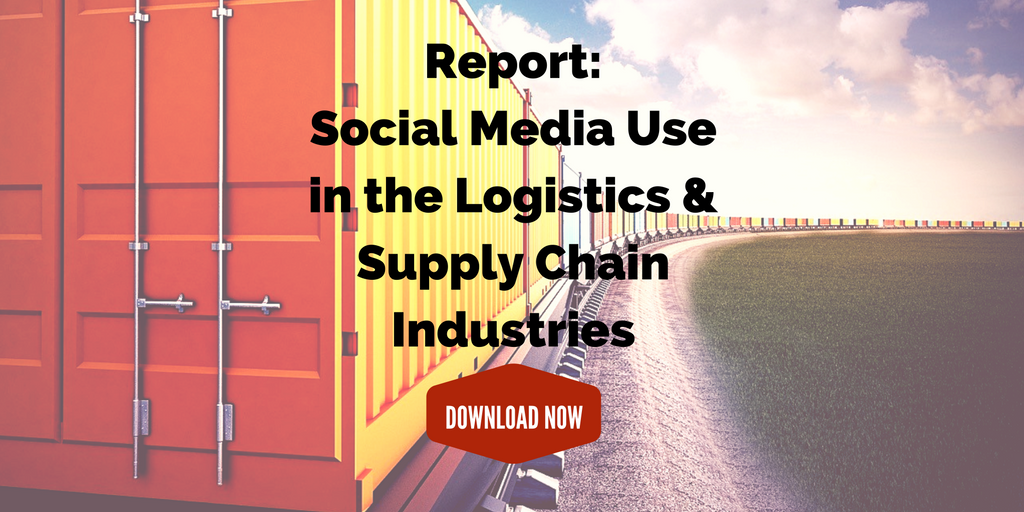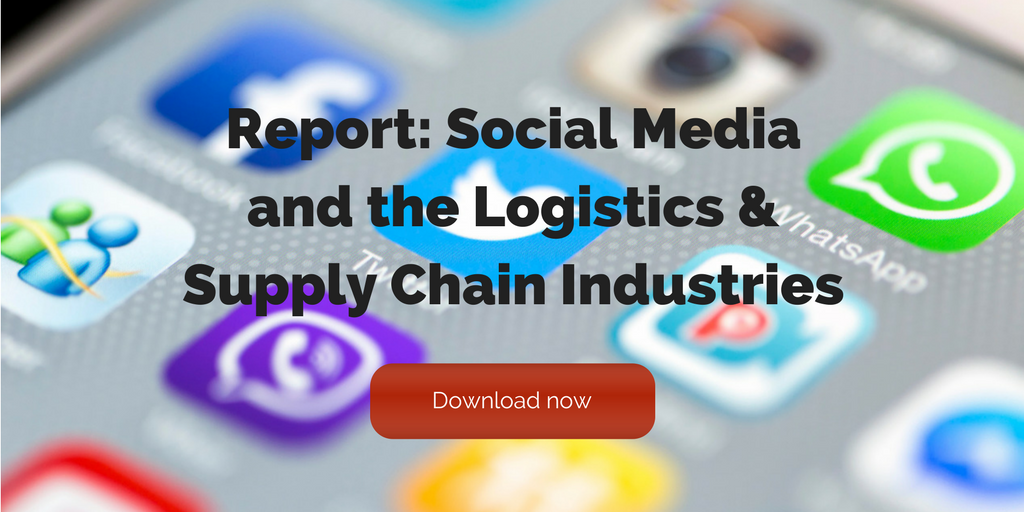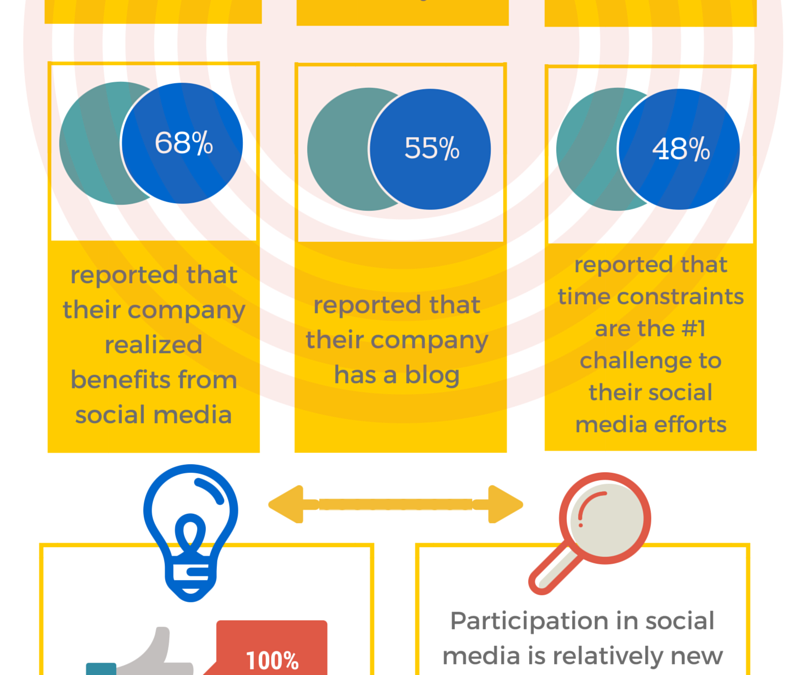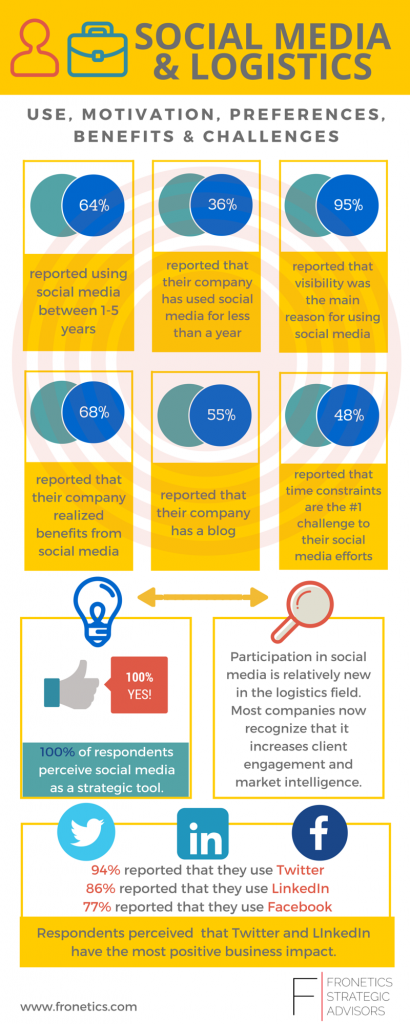
by Fronetics | Sep 21, 2017 | Blog, Content Marketing, Logistics, Marketing, Social Media, Strategy, Supply Chain
Our resources for supply chain marketers include step-by-step DIY guides, industry reports, marketing templates, and case studies.
Here at Fronetics, we specialize in digital and content marketing for supply chain and logistics businesses. We understand the unique needs and challenges facing these companies, particularly when it comes to the consistent, strategic creation of content.
I try to provide regular tips, updates, and how-tos on this blog for those of you hoping to improve your marketing efforts. But sometimes our readers need a little more in-depth guidance. That’s why we have created a number of different resources for supply chain marketers.
Below, you’ll find a list and a summary of our 10 most popular resources. Included are step-by-step guides, industry reports, templates, case studies and more. These resources offer information on subjects from building a content strategy to creating better content to social media use among supply chain businesses.
I hope you enjoy! And, as always, if you don’t see what you’re looking for, please email me and let me know. I’m always seeking new ideas for content that will be helpful for supply chain marketers.
10 resources for supply chain marketers
Use these 10 resources to create a multi-channel content strategy that maximizes your digital reach. After all, a well-developed content strategy and social media presence will help prospects to find you, buyers to know you, and customers to trust you.
1) How the Logistics and Supply Chain Industries are Using Social Media
Fronetics conducted a survey of individuals within the logistics and supply chain industries. The objective of the survey was to gain insight into the use of social media within these industries. Specifically, to learn more about why companies within the logistics and supply chain industries are using social media, the benefits they have realized, and challenges they have encountered.

2) Social Media and the Logistics and Supply Chain Industries 2016
Companies within the supply chain and logistics industries have begun to recognize the value of social media — and are starting to reap the benefits. Both large and small businesses alike can profit from the use of social technologies as part of their marketing strategy, and they can reduce their marketing costs by doing so. This white paper defines social media and social technologies, identifies users and usage patterns, and describes some of the benefits that companies within the logistics and supply chain industries can realize through participation.

3) 3PL Cerasis Acquires 98 New Customers through Content Marketing
This case study looks at Cerasis, a leading freight logistics company. Despite realizing positive growth for 15 years, Cerasis was not attracting larger and more sophisticated shippers, brand awareness was low, and most importantly, they were not perceived as a leader within the industry. A content marketing strategy — inclusive of participation in social media and content creation, curation, and distribution — led to 14% increased revenue, 14% increase in lead-to-customer conversion rate, and over a 1000% increase in web and social traffic.

4) Monthly Marketing Reporting Template
Tracking and monitoring certain marketing metrics helps you quantify the progress of your marketing program. But you can also measure the ROI and make changes to your strategy to make it more effective. Use this report template to optimize your strategy, produce monthly reports, and create presentations.

5) Content Use in the Logistics and Supply Chain Industries
Content marketing has transformed the way businesses connect and share relevant information with their audiences. The publication and distribution of content is a strategy now widely used by supply chain companies to build trust and influence among peers, prospects and customers. Through a survey conducted on the use of content within the logistics and supply chain industries, this report offers broad insight into the overall role and influence of content.

6) Content Marketing Guide for the Logistics and Supply Chain Industries
Despite all its benefits, content marketing isn’t so easy. In fact, supply chain and logistics companies report that creating and executing an effective content marketing strategy is a top challenge for their businesses. In response, we developed this guide. It will help you create a strategy that will attract your target audience and drive profitable customer action.

7) Content Strategy Template
An effective content marketing strategy is one that is aligned with your company’s business goals and objectives. Furthermore, an effective content marketing strategy focuses on attracting and engaging prospects. All created, curated, and distributed content should target your ideal customer. Use this template to help develop and drive your content strategy.

8) On Writing Good Content: A Guide for the Logistics and Supply Chain
27 million pieces of content are shared every day. And most if it isn’t worth reading. To attract readers, your content must stand out. You must be strategic about how often you publish, where you distribute, and, most importantly, the quality of the content your produce. This guide will help you learn the basic principles of good content. It will also help identify content creators within your organization and brainstorm ideas for original and effective content.

9) Blog Editorial Calendar Template
This template is designed to keep you on track as you develop content that will attract and engage your prospects and customers. It will help you map out your content in a strategic manner, maximize productivity, and keep you organized. It includes weekly and monthly worksheets, as well as an ideas worksheet for tracking blog post ideas.

10) 12 Elements of an Effective Content Marketing Strategy
Content marketing is a strategic marketing approach focused on creating and distributing content to attract and retain a clearly defined audience. Interest in content marketing has climbed steadily since 2011, but a 2017 survey of 6,000+ global marketers found that 71% considered it their primary approach to marketing (76% in North America). This slideshow walks you through 12 elements of an effective strategy to achieve the best results for your business.


by Fronetics | Dec 15, 2016 | Blog, Content Marketing, Logistics, Marketing, Social Media, Supply Chain
Here are our 10 most-read social media posts of 2016.
Social media is no longer optional. Today, B2B and B2C companies need to be active on social media. Companies that aren’t are making a strategic mistake that will impact their bottom line.
At Fronetics we work with companies to create and execute social media strategies. Moreover, we serve as an educational resource for companies within the logistics and supply chain industry.
Here are the 10 most-read posts about social media from our blog in 2016.
A question we often get here at Fronetics is: How often should my business tweet? We explore this question and give you an answer. Read more.
Facebook Live offers businesses a new, creative platform for engaging customers — here’s how to use it. Read more.
When it excels at social media, a company’s opportunity for growth is as vast as the web itself. Today, even small businesses can compete shoulder to shoulder with their biggest competitors if leveraging social media properly. These four supply chain companies constantly post fresh, quality content to their social media accounts. Read more.
Social media facts collected from various studies, offer insight into how people and businesses are using social networking today. Read more.
Censorship is always a hot-button issue, and, when combined with social media, things can heat up even more. The topic is debated in law school classrooms, at dinner parties, and in courtrooms. What should be shared and written on social media? Should companies censor what their employees post? Read more.
One of the top social media sites for B2B marketers, Twitter can help businesses spread brand awareness and communicate with customers. Read more.
A cross-departmental social media team will improve your company’s social presence. Read more.
This is a guest post written by Tania Seary, founder of Procurious, the world’s first online social network for supply chain and procurement professionals. In the post Seary shares how Procurious has used social media to build Procurious. Read more.
When you are posting on social media could be as important as what you’re posting. Read more.
If your company is not participating in social media, you are at a disadvantage. Your customers, your employees, and your competitors are taking advantage of these technologies to conduct business in new, more efficient ways. Read more.


by Fronetics | Jan 11, 2016 | Blog, Content Marketing, Logistics, Marketing, Social Media, Strategy, Supply Chain

Over the past year we have helped many clients both develop and execute social media strategies. We have also disseminated information on how companies can use social media as an effective business tool.
Here are the top 10 social media articles from 2015:
Leads are essential to the growth of your business, and your marketing strategy is built around finding and connecting with leads. So when 92% of all marketers indicate that their social media efforts have generated more exposure for their businesses, you should take note and make social media part of your prospecting strategy. Read the full article.
The supply chain makes the world go round. In order to be one of the leaders in the chain, it’s important to remember that internet users make up nearly half of the world’s population and that social media is on the rise. Don’t miss that boat. Read the full article.
Many transportation and logistics companies think about social media and how to use it, but cite a lack of time as a reason they haven’t explored the various platforms. Thinking about how social media can work for your logistics or transportation company is the first stop towards progress. Read the full article.
Social media is an ideal marketing platform for small businesses because it can be relatively inexpensive but have a high impact on growth. With a targeted strategy in place and a little time, your company can cultivate your brand, engage with customers, and form business relationships. And because small companies can be nimble, you can continually adjust your strategy to ensure the return on investment keeps paying off. Two companies that have seen social media to be effective: Coyote Logistics and Transplace. Read the full article.
The social economy is estimated to be $1.3 trillion U.S. dollars annually. Social media is more than a collection of personal commentary, photos, and inspirational quotes. Increasingly, social media creates an opportunity to gather information, and social media is becoming a useful tool for businesses to connect with other businesses and clients. Although Facebook is notorious for gathering information, social media companies are not the only companies who can gather intelligence. Read the full article.
Offering unparalleled access to leads and face to face communication with prospects and customers, trade shows prove to be a successful marketing strategy for many companies. But is your company making the most of trade shows? Companies that integrate modern digital communication practices into tired trade show routines are likely to increase lead to customer conversion rates while shortening lead and sales cycles. Read the full article.
Companies within the logistics and supply chain industries have been slower to participate in social media than other industries. The primary reason being because of a lack of understanding of what social media is and the role it can play for business. Unfortunately, companies who do not participate in social media miss out on opportunities – and revenue. Read the full article.
Using the information and intelligence gathered is essential. There is; however, another critical element: engagement. Engagement is a differentiator. Without engagement you are a lurker. You don’t want to be a lurker. Read the full article.
Social media has been found to be a strategic tool for logistics companies. Check out our infographic. Read the full article.
Through the use of social media you can enable consumers to make more informed purchase decisions. Additionally, you can use social media to answer questions and better educate consumers on how to use your product thereby reduce no fault found returns. Read the full article.
Social media is an incredible tool; however, for it to be effective it must be driven by strategy, be consistent, and must have someone managing the execution. At Fronetics, our social media strategists distribute content, curate content, engage your target audience, and monitor your social networks. We develop a social media strategy that aligns with your company’s goals. We analyze your competition, classify your target audience & cultural attributes, identify the influencers in your industry, recommend platforms, detail best engagement practices, create social media schedules, and identify specific tactics that deliver results. Through the proper execution of social media, your brand is given a voice and personality, and becomes more accessible to your target audience.

by Fronetics | Aug 6, 2015 | Blog, Logistics, Marketing, Social Media, Supply Chain, Transportation & Trucking

Transportation and logistics is a field that is booming. The business is a money-maker and a cornerstone of day-to-day functioning. It’s one that has been present for centuries. We are well past the Age of Discovery, but transportation and logistics companies carry on the torch of moving products that people need and desire around the world. One might wonder if the sultriness of the Silk Road and the Spice Trade has lost its allure and sexiness, but that needn’t be the case. Social media has brought about a fantastic opportunity for transportation and logistics companies to share their successes, display their offerings, create community, and convert leads.
Where to Start
First, think about it. Many transportation and logistics companies think about social media and how to use it, but cite a lack of time as a reason they haven’t explored the various platforms. Thinking about how social media can work for your logistics or transportation company is the first stop towards progress.
Second, learn about it. Understanding individual usage of social media versus B2B usage of social media is important. Do your consumers use LinkedIn, Facebook, Twitter? Where are your competitors finding success, and what platforms are they missing? Once you figure these things out the impulse will be to get started. Post away! Tweet away! Blog away! However, creating a Facebook page or a Twitter account will not draw in your community of employees or existing clients, and will not attract potential customers or clients. Having an account is great thing, but it’s not the most important thing. Knowing how to express your brand, what content to curate and create, and how frequently to share content is critical to social media success.
Learning is a process and takes time. Set up also takes time. Hiring an outside agency to do this work can both save you time, and will ultimately reap ROI. Marketing strategy companies have been doing this work already, and understand how to highlight your company. They know the market, and once they get to know you a bit better, you can work together to figure out how to express your brand through the platform of social media.
What to Highlight
Once you figure out who to focus on and how to reach that community, creating and curating your unique content is key. What is most informative and helpful to your clients? What will feel meaningful to them? What will catch and hold their attention? How do you want people to perceive you, your employees, and your products/services? Some studies have shown that conversion rates from social media can be 100% more effective than from outbound marketing, so getting this right could greatly benefit your company.
The joy of social media is its speed and its ability to humanize a company. A company’s Twitter feed is not like its white papers. Social media is known for personalizing things, so let people know the more human side of your business. Who are the drivers? Who are the employees? What are the success stories? Celebrate your community, partners, and clients. This is a place to engage with other businesses – to educate them and learn from them.
One perfect example of a logistics company that thrives in this arena is UPS. The logistics company has found success with unique, fun, interesting, frequent posts, tweets, and blogs. They also highlight their “heroes” by telling stories, often through video, of their heroic drivers who have been known to save lives. They show the human side of delivery. They connect. And when it comes to social media, it’s all about connection.
Two other examples of companies that excel in this area are Sourcemap and Transfix. Both companies have leveraged social media as a platform for growth. Sourcemap’s founder and CEO Leonardo Bonanni credits social media for the success for his business: “Sourcemap wouldn’t be here without social media.” For Transfix, social media and digital technologies enables the company to make the trucking industry more efficient and user-friendly.
Fronetics Strategic Advisors is a leading management consulting firm. Our firm works with companies to identify and execute strategies for growth and value creation.
When it comes to marketing we work with our clients to create and execute strategies that drive success and elevate their brand position within the industry. Unlike other firms, we align marketing programs with business objectives and, through a data driven approach, are able to deliver results with a targeted ROI. Our team is comprised of strategists, marketing professionals, writers, designers, and experts in social media. Together we leverage our experience to increase brand awareness, position our clients as thought leaders, drive meaningful engagement with prospects and customers, and help businesses grow.



by Fronetics | Jun 10, 2015 | Blog, Logistics, Marketing, Social Media, Strategy, Supply Chain
Fronetics Strategic Advisors conducted a survey focusing on social media and logistics and supply chain companies. Respondents shared information on their social media use, motivation, preferences, benefits, and challenges. One-hundred percent (100%) of respondents reported that they have used social media for five years or less, indicating that social media is a relatively new strategy for logistics and supply chain companies. Mirroring other industries, including those in Fortune 500 status, social media is playing an increasingly important role in company branding, marketing, and client engagement.
For the current state of social media and logistics, here is an infographic that summarizes many of the key points from the full report.



















